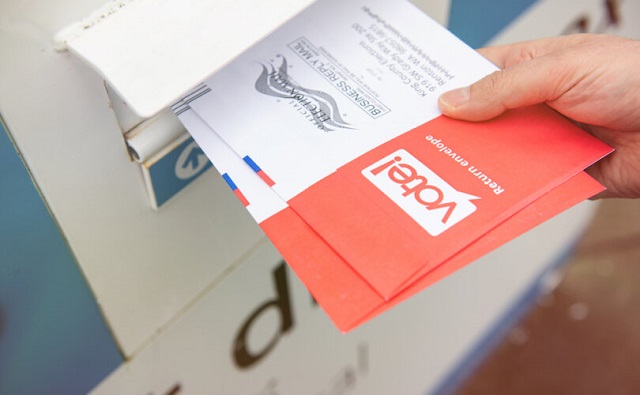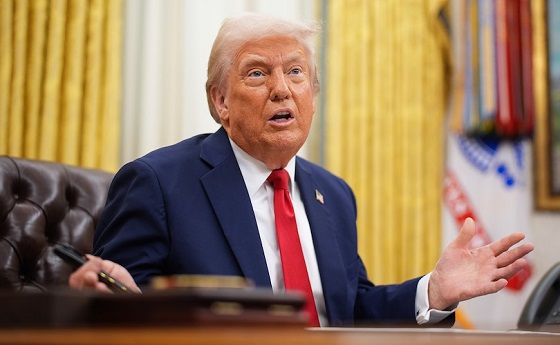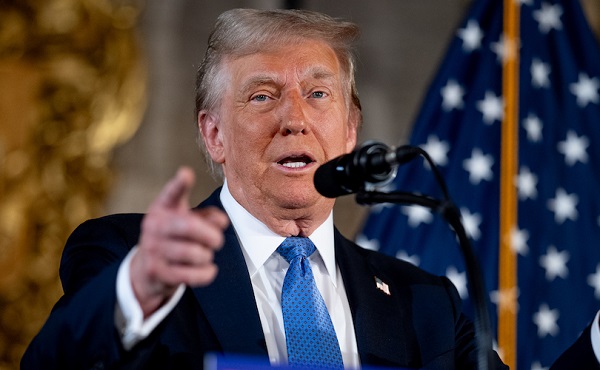espionage
One in five mail-in voters admitted to committing voter fraud during 2020 election: Rasmussen poll

From LifeSiteNews
21% of mail-in voters admitted to illegally filling out a ballot on someone else’s behalf, and 17% admitted to voting from a state where they are not a legal resident.
One-fifth of voters who cast mail-in ballots during the 2020 presidential election admitted to committing at least one kind of voter fraud, according to the results of a recent poll conducted by Rasmussen Reports and The Heartland Institute.
Tucker Carlson posted to X on Friday an excerpt of a discussion with Justin Haskins, director of the Socialism Research Center at the Heartland Institute, in which Haskins explained how a poll conducted together with Rasmussen Reports revealed widespread illegal voter activity among mail-in voters during the 2020 election. The poll was first published in December, 2023.
About one in five mail-in ballots in the last election was fraudulent, handing Biden the presidency. We know this because the people who committed the fraud have admitted it in a new poll. pic.twitter.com/fxHL9hT4sw
— Tucker Carlson (@TuckerCarlson) April 26, 2024
Respondents who indicated that they voted by mail in the 2020 election were asked a series of questions probing for illegal, fraudulent activity, although the questions did not explicitly label these activities as “fraud.”
“For example, we asked people, ‘Did you vote in a state where you’re no longer a legal resident? If you’re not a permanent resident of a state, you can’t vote there. 17% of people, nearly one in five, said yes,” Haskins told Carlson.
He further shared that 21% of mail-in voters admitted to filling out a ballot on behalf of someone else, another illegal activity, and 17% admitted to forging a signature on someone else’s behalf, “with or without their permission.”
“So all told, it’s at least one in five mail-in ballots involved some kind of fraudulent activity,” said Haskins.
Of all voter respondents — both those who voted by mail and those who voted in person —10% said that “a friend, family member, co-worker, or other acquaintance” admitted to them that they voted by mail in a state other than the one they are registered in as their state of permanent residence.
“The results of this survey are nothing short of stunning,” Haskins remarked following the poll results. “For the past three years, Americans have repeatedly been told that the 2020 election was the most secure in history. But if this poll’s findings are reflective of reality, the exact opposite is true. This conclusion isn’t based on conspiracy theories or suspect evidence, but rather from the responses made directly by the voters themselves.”
“A democratic republic cannot survive if election laws allow voters to commit fraud easily, and that’s exactly what occurred during the 2020 election,” he continued. “Although some progress has been made in more than a dozen states since the conclusion of the 2020 election, much more work is needed in most regions of the United States. If America’s election laws do not improve soon, voters and politicians will continue to question the truthfulness and fairness of all future elections.”
Carlson pointed out that claims that the 2020 presidential election results were based on fraudulent votes are considered a “criminal offense” now in the U.S., at least to the extent that “that crime appears to form the basis of one of Trump’s pending indictments.” The indictment in question claims that Trump used “false claims of election fraud to obstruct the federal government function by which those results are collected, counted, and certified.”
Mounds of evidence of fraud in the 2020 general election have emerged, but this has been widely ignored by the mainstream media.
For example, in 2022, a peer-reviewed paper from accomplished economist and former senior researcher for the Department of Justice (DOJ), John Lott, compiled statistical evidence of voter fraud in the 2020 election, specifically, of about “255,000 excess votes (possibly as many as 368,000) for Joe Biden in six swing states where Donald Trump lodged accusations of fraud.”
Batches of votes that were suspiciously tallied overwhelmingly for Biden were reported the night of the election, reversing a former Trump lead in states like Pennsylvania and Wisconsin. And before the election, Project Veritas released a video showing voters being bribed and coaxed to vote for Democrats, including by changing their votes on the ballot.
espionage
Longtime Liberal MP Warns of Existential Threat to Canada, Suggests Trump’s ’51st State’ Jibes Boosted Carney

 Sam Cooper
Sam Cooper
In striking remarks delivered days after Canada’s federal election, former longtime Liberal MP John McKay suggested that threats from President Donald Trump helped propel Prime Minister Mark Carney to power—and warned that Canada is entering a period of “existential” uncertainty. He likened the threat posed by Trump’s second term to the peril Taiwan faces from China’s Xi Jinping.
“This was the most consequential election of my lifetime,” said McKay, who did not seek re-election this year after serving as a Liberal MP since 1997. “I would always say, ‘This is the most important election of your lifetime,’ and usually I was right. But this time—I was really right. This one was existential.”
Explaining his assertion, McKay added: “I was thinking of the alienating and irritating comments by a certain president that Canada should become the 51st state. We should actually send President Trump a thank-you card for his stimulus to Canadian patriotism, which has manifested itself in so many different ways. Who knew that shopping at Loblaws would become a patriotic act?”
The Toronto-area MP, who has made several visits to Taiwan over the past two decades, drew a controversial comparison between how Taiwan faces the constant threat of invasion and how Canada is now confronting an increasingly unreliable United States under the influence of Trump-era nationalism.
McKay was the first speaker at an event co-hosted by the Government of Taiwan and the Macdonald-Laurier Institute, focused on the People’s Republic of China’s growing use of “lawfare”—legal and bureaucratic tactics designed to pressure Western governments into accepting Beijing’s One China Policy and denying Taiwan’s sovereignty. While China’s claims over Taiwan may appear to have gained tacit acceptance at the United Nations, U.S. expert Bonnie Glaser later clarified that Beijing’s position is far from settled law. The issue, she said, remains open to interpretation by individual governments and is shaped by evolving geopolitical interests. Glaser, a leading authority on Indo-Pacific strategy, added that subtle but meaningful shifts during both the first and second Trump administrations are signaling a quiet departure from Beijing’s legal framing.
“Our institutions are being bullied—that they will be denied involvement with the U.N. unless they accept that Taiwan is a province of China,” Glaser said.
McKay, framing most of his comments on the past election, argued Canadians now face subtle but real consequences when engaging with American products and institutions. He argued that Canada can no longer assume the United States will act as a reliable partner on defense or foreign policy. “Maybe a few weeks or months ago, we could still count on the security umbrella of the United States,” he said. “That is no longer true—and the Prime Minister has made that abundantly clear.”
Predicting that Prime Minister Mark Carney “may be a very unpopular politician within six months,” McKay warned Canadians to prepare for a period of sacrifice and difficult decisions: “We’re not used to asserting our sovereignty. Taiwan lives that reality every single day.”
Citing Canada’s pivot toward new defense arrangements—including the recent purchase of over-the-horizon radar from Australia instead of the United States—McKay said the country is entering a new era of security realignment. “New alliances, new consequences, new changes,” he said. “This will create some real disturbing issues.”
He contrasted China’s strategic approach with the erratic behavior of the United States under Trump: “President Xi conducts the trade war like a chess match—methodical, searching for new alliances. Our supposed security partner conducts it like flip-gut,” McKay said, referring to a children’s game he plays with his grandchildren. “Sometimes the piece turns over, sometimes it falls off the table. But the one guarantee is—there is no guarantee.”
Another speaker, Professor Scott Simon of the University of Ottawa, took a far sharper stance on Beijing’s role in the increasingly volatile geopolitical environment, describing China as part of a “new axis of evil” engaged in cognitive warfare targeting both Taiwan and Canada.
“We have to be part of the alliance of good,” Simon said. “China is part of that axis of evil. We have to be honest about that.”
Drawing on recent global crises—including the war in Ukraine and the October 7 Hamas attacks on Israel—Simon argued that democracies like Canada have lulled themselves into a false sense of security by believing that trade and engagement would neutralize authoritarian threats.
“For the past 40 years, we’ve been very complacent,” he said.
Expanding on Beijing’s tactics, Simon said: “They’re active against the Philippines, South Korea, Japan—and Taiwan is only part of it. What they’re using now is a combination of military threats—what we often call gray zone operations—but also cognitive and psychological warfare, as well as lawfare. And they use these techniques not just in Taiwan, but in Canada. And so Canada has to be a part of countering that lawfare.”
The Bureau is a reader-supported publication.
To receive new posts and support my work, consider becoming a free or paid subscriber.
Invite your friends and earn rewards
Banks
TD Bank Account Closures Expose Chinese Hybrid Warfare Threat

From the Frontier Centre for Public Policy
Scott McGregor warns that Chinese hybrid warfare is no longer hypothetical—it’s unfolding in Canada now. TD Bank’s closure of CCP-linked accounts highlights the rising infiltration of financial interests. From cyberattacks to guanxi-driven influence, Canada’s institutions face a systemic threat. As banks sound the alarm, Ottawa dithers. McGregor calls for urgent, whole-of-society action before foreign interference further erodes our sovereignty.
Chinese hybrid warfare isn’t coming. It’s here. And Canada’s response has been dangerously complacent
The recent revelation by The Globe and Mail that TD Bank has closed accounts linked to pro-China groups—including those associated with former Liberal MP Han Dong—should not be dismissed as routine risk management. Rather, it is a visible sign of a much deeper and more insidious campaign: a hybrid war being waged by the Chinese Communist Party (CCP) across Canada’s political, economic and digital spheres.
TD Bank’s move—reportedly driven by “reputational risk” and concerns over foreign interference—marks a rare, public signal from the private sector. Politically exposed persons (PEPs), a term used in banking and intelligence circles to denote individuals vulnerable to corruption or manipulation, were reportedly among those flagged. When a leading Canadian bank takes action while the government remains hesitant, it suggests the threat is no longer theoretical. It is here.
Hybrid warfare refers to the use of non-military tools—such as cyberattacks, financial manipulation, political influence and disinformation—to erode a nation’s sovereignty and resilience from within. In The Mosaic Effect: How the Chinese Communist Party Started a Hybrid War in America’s Backyard, co-authored with Ina Mitchell, we detailed how the CCP has developed a complex and opaque architecture of influence within Canadian institutions. What we’re seeing now is the slow unravelling of that system, one bank record at a time.
Financial manipulation is a key component of this strategy. CCP-linked actors often use opaque payment systems—such as WeChat Pay, UnionPay or cryptocurrency—to move money outside traditional compliance structures. These platforms facilitate the unchecked flow of funds into Canadian sectors like real estate, academia and infrastructure, many of which are tied to national security and economic competitiveness.
Layered into this is China’s corporate-social credit system. While framed as a financial scoring tool, it also functions as a mechanism of political control, compelling Chinese firms and individuals—even abroad—to align with party objectives. In this context, there is no such thing as a genuinely independent Chinese company.
Complementing these structural tools is guanxi—a Chinese system of interpersonal networks and mutual obligations. Though rooted in trust, guanxi can be repurposed to quietly influence decision-makers, bypass oversight and secure insider deals. In the wrong hands, it becomes an informal channel of foreign control.
Meanwhile, Canada continues to face escalating cyberattacks linked to the Chinese state. These operations have targeted government agencies and private firms, stealing sensitive data, compromising infrastructure and undermining public confidence. These are not isolated intrusions—they are part of a broader effort to weaken Canada’s digital, economic and democratic institutions.
The TD Bank decision should be seen as a bellwether. Financial institutions are increasingly on the front lines of this undeclared conflict. Their actions raise an urgent question: if private-sector actors recognize the risk, why hasn’t the federal government acted more decisively?
The issue of Chinese interference has made headlines in recent years, from allegations of election meddling to intimidation of diaspora communities. TD’s decision adds a new financial layer to this growing concern.
Canada cannot afford to respond with fragmented, reactive policies. What’s needed is a whole-of-society response: new legislation to address foreign interference, strengthened compliance frameworks in finance and technology, and a clear-eyed recognition that hybrid warfare is already being waged on Canadian soil.
The CCP’s strategy is long-term, multidimensional and calculated. It blends political leverage, economic subversion, transnational organized crime and cyber operations. Canada must respond with equal sophistication, coordination and resolve.
The mosaic of influence isn’t forming. It’s already here. Recognizing the full picture is no longer optional. Canadians must demand transparency, accountability and action before more of our institutions fall under foreign control.
Scott McGregor is a defence and intelligence veteran, co-author of The Mosaic Effect: How the Chinese Communist Party Started a Hybrid War in America’s Backyard, and the managing partner of Close Hold Intelligence Consulting Ltd. He is a senior security adviser to the Council on Countering Hybrid Warfare and a former intelligence adviser to the RCMP and the B.C. Attorney General. He writes for the Frontier Centre for Public Policy.
-

 Alberta1 day ago
Alberta1 day agoIt’s On! Alberta Challenging Liberals Unconstitutional and Destructive Net-Zero Legislation
-

 Business2 days ago
Business2 days agoTrump’s bizarre 51st state comments and implied support for Carney were simply a ploy to blow up trilateral trade pact
-

 Alberta1 day ago
Alberta1 day agoAlberta’s future in Canada depends on Carney’s greatest fear: Trump or Climate Change
-

 Frontier Centre for Public Policy2 days ago
Frontier Centre for Public Policy2 days agoTrust but verify: Why COVID-19 And Kamloops Claims Demand Scientific Scrutiny
-

 2025 Federal Election18 hours ago
2025 Federal Election18 hours agoThe Liberals torched their own agenda just to cling to power
-

 COVID-192 days ago
COVID-192 days agoStudy finds Pfizer COVID vaccine poses 37% greater mortality risk than Moderna
-

 Agriculture1 day ago
Agriculture1 day agoLiberal win puts Canada’s farmers and food supply at risk
-

 Business20 hours ago
Business20 hours agoTrump says he expects ‘great relationship’ with Carney, who ‘hated’ him less than Poilievre



